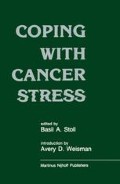Abstract
Doctors’ attitudes to informing patients of their diagnosis have changed over the last 25 years (see Chapter 1) and more people are today aware that they have cancer (1, 2). The few reports on the impact of this increased awareness on patients are of two types. The first comes from experienced physicians, tends to be anecdotal and offers virtually no quantitative data. The second comes from psychologists and psychiatrists, is based on relatively small and precisely defined groups which provide quantitative data, but may rely on methods too complex or too obscure to be readily reproduced. In this chapter, three separate questions will be considered: what is the response of the individual to the diagnosis, what determines this response, and which responses are beneficial?
Access this chapter
Tax calculation will be finalised at checkout
Purchases are for personal use only
Preview
Unable to display preview. Download preview PDF.
References
Novack, D.H., Freireich, E.J., Vaisrub, S. (1979) Changes in the physician’s attitude towards telling the cancer patient. Journal of the American Medical Association, 241, 897–900.
Anonymous (1980) In cancer, honesty is here to stay. Lancet, ii, 2445.
Lloyd G.G., Parker, A.C., Ludlam C.A., McGuire R.J. (1984) Emotional impact of diagnosis and early treatment of lymphomas. Journal of Psychosomatic Research, 28, 1577–162.
Senescu R.A. (1964) The development of emotional complications in the patient with cancer. Journal of Chronic Disease, 16, 813–832.
Luce J. K. (1979) Selecting patients for supportive therapy. In, Mind & Cancer Prognosis. (Ed. B. A. Stoll) John Wiley, Chichester, pp 127–137.
Bodkin C.M., Piggott, T.J., Mann J.R. (1982) Financial burden of childhood cancer. British Medical Journal, 284, 1542–1544.
Greer, S., Morris, T., Pettingale, K.W. (1979) Psychological response to breast cancer: effect on outcome. Lancet, ii, 785–787.
Pettingale, K.W. (1984) Coping and cancer prognosis. Journal of Psychosomatic Research, 28, 363–364.
Morris, T. (1983) Psychosocial aspects of breast cancer: a review. European Journal of Cancer and Clinical Oncology, 19, 1725–1733.
Peters-Golden, H. (1982) Breast cancer: varied perceptions of social support in the illness experience. Social Science & Medicine, 16, 483–491.
Roberts, M.M., French, K., Duffy, J. (1984) Breast cancer and breast self-examination: what do Scottish women know? Social Science & Medicine, 18, 791–797.
Gotay, C.G. (1984) The experience of cancer during early and advanced stages: the views of patients and their mates. Social Science & Medicine, 18, 605–613.
Bond, M.R. (1971) The relation of pain to the Eysenck personality inventory, Cornell medical index and Whiteley index of hypochondriasis. British Journal of Psychiatry. 119, 671–678.
Aitken-Swan, J., Easson, E.C. (1959) Reactions of cancer patients on being told their diagnosis. Lancet, i. 779–783.
Brewin, T.B. (1977) The cancer patient: communication and morale. British Medical Journal, iv, 1623–1627.
McIntosh, J. (1976) Patients awareness and desire for information about diagnosed but undisclosed malignant disease. Lancet, ii, 300–303.
Cassileth, B.R., Zupkis, R.V., Sutton-Smith, K., March, V. (1980) Information and participation preferences among cancer patients. Annals of Internal Medicine, 92, 832–836.
Lloyd, G.C. (1979) Psychological stress and coping mechanisms in patients with cancer. In, Mind and Cancer Prognosis. (Ed B. A. Stoll) John Wiley, Chichester, pp 47–59.
Editor information
Editors and Affiliations
Rights and permissions
Copyright information
© 1986 Martinus Nijhoff Publishers, Dordrecht
About this chapter
Cite this chapter
Priestman, T.J. (1986). Impact of Diagnosis on the Patient. In: Stoll, B.A. (eds) Coping with Cancer Stress. Springer, Dordrecht. https://doi.org/10.1007/978-94-009-4243-1_3
Download citation
DOI: https://doi.org/10.1007/978-94-009-4243-1_3
Publisher Name: Springer, Dordrecht
Print ISBN: 978-0-89838-817-6
Online ISBN: 978-94-009-4243-1
eBook Packages: Springer Book Archive

